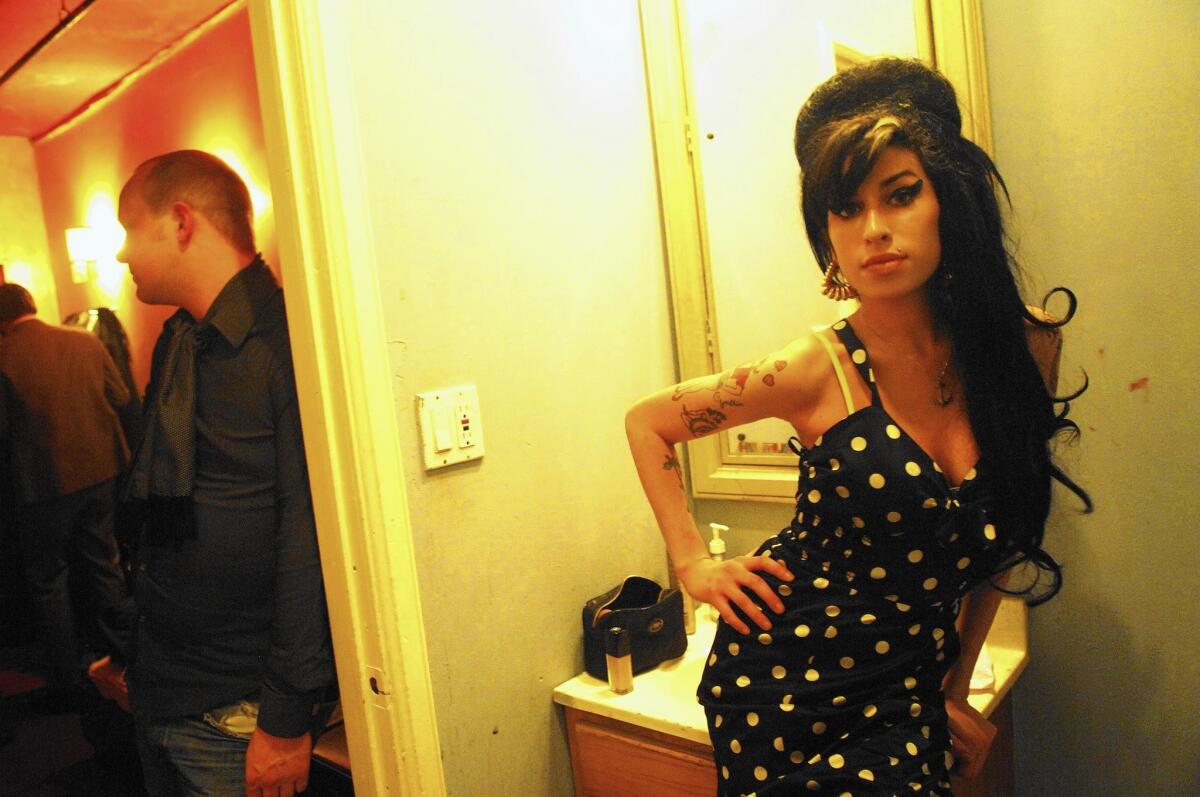‘Amy’ tracks singer Winehouse’s soaring talent, tragic demise

- Share via
Before she won six Grammys (including a trio for her massive breakout hit “Rehab”), before she descended into a morass of addiction and public humiliation, before she died of alcohol poisoning at age 27, bravura British songwriter and vocalist Amy Winehouse was simply a young woman with an extraordinary gift for song.
Even as a teenager, producer Salaam Remi says, “she had the stylings of a 65-year-old jazz singer who knew the ropes up and down.” Pianist Sam Beste, who accompanied her in those early days, says, “she needed music as if it were a person. She would die for it.” Fearless in front of a microphone, she was terrified of only one thing: the prospect of fame.
“I don’t think I’m going to be at all famous,” she said nervously in a radio interview when she was but 20. “I don’t think I can handle it. I’d probably go mad.”
Then, five years later, she wrote and performed “Rehab,” a snappy, cheeky song about her refusal to enter drug rehabilitation, and the sky fell in. “In our business, nothing can prepare you for that level of success,” a record executive says. “It’s like nothing you’ve ever experienced.” Three years later, Amy Winehouse was dead.
This story of ability and tragedy is on one level a familiar one, both as it relates to the singer’s specific and much-publicized travails and to those of rock stars in general. (The so-called 27 Club includes Kurt Cobain, Jimi Hendrix, Janis Joplin and Jim Morrison.)
But it is the achievement of “Amy,” Asif Kapadia’s accomplished, quietly devastating documentary, that it makes the story of this troubled and troubling individual surprisingly one of a kind by allowing us to, in a sense, live her life along with her.
That sensation is a result of a technique director Kapadia used on “Senna,” his marvelous examination of the life of legendary Formula One driver Ayrton Senna. Rather than show us talking heads, Kapadia records all his interviews (he did more than a hundred here) on audio only, playing the words as voice-over as a wide variety of contemporary imagery, including personal videos, news shots and performance footage (expertly edited by Chris King) play out on the screen.
This system works only if you have the cooperation of the major players in your subject’s life, and though it took a considerable amount of time, Kapadia and producer James Gay-Rees made that happen. Heard in the film are the singer’s lifelong friends Juliette Ashby and Lauren Gilbert; her first manager, Nick Shymansky (who provided hours of candid video footage); her morally challenged ex-husband, Blake Fielder-Civil; and her father, Mitch Winehouse, who figures in the lyrics of “Rehab” as telling her she’s “fine” without it.
The senior Winehouse has also been much heard outside the film, publicly complaining that the finished product misrepresents his daughter’s life and his part in it. But though a sense of looming tragedy hangs over Winehouse’s story, it is less the business of “Amy” to apportion blame than to dispassionately let us know exactly what happened.
The documentary begins at a happy point in Winehouse’s life, as she’s shown singing and fooling around at girlfriend Lauren’s 14th birthday. Incandescent, charming, full of sassy energy, she also has, even then, a remarkable, bluesy voice.
Fittingly for someone a friend calls “a very old soul in a very young body,” Winehouse always gravitated toward jazz, idolizing such singers as Dinah Washington and Sarah Vaughan. “Success to me,” she says, “is having the freedom to work. Leave me alone and I will do the music.”
As it turned out, Winehouse was exceptionally good at writing her own material, the best of which appears here as type on the screen. The singer’s strongest work, from “Back to Black” to “Rehab,” was laceratingly personal, and “Amy” is especially good at illustrating how closely her lyrics mirrored whatever hell she was going through.
For Winehouse’s experiences were often bleak. Father Mitch was invariably away from home, and Winehouse took out her resentment by acting out and becoming uncontrollable. She also developed a difficulty with bulimia that never left her.
Moving to her own apartment once record-company money provided the means, Winehouse soon became involved with a fellow self-destructive (“We were like twins,” he says) in Fielder-Civil, the man who introduced her to crack cocaine and whom she later married.
As Winehouse’s life spirals toward oblivion, two major negative forces make their presence felt, starting with the virulent, corrosive nature of the tabloid media that hounded her mercilessly and eventually ate her alive.
More than that, and without naming names because there are too many to list, the people around Winehouse collectively let her down, abdicating responsibility by viewing her more as a golden ticket than a person seriously in need of help.
One of the few things that didn’t let Winehouse down was her music. One of “Amy’s” most poignant moments is footage of a duet with Tony Bennett, one of her childhood idols, that she did just a few months before she died.
It starts badly, with Winehouse shaky and fretting that she doesn’t want to waste Bennett’s time, but she pulls it together and a beautiful rendition of “Body and Soul” results. The waste this unblinking documentary outlines is of a different sort, the squandering of a gifted life cut far too short.
------------------------
‘Amy’
MPAA rating: R, for language and drug material
Running time: 2 hours, 8 minutes
Playing: AMC Century City, ArcLight Hollywood, Landmark West Los Angeles
More to Read
Only good movies
Get the Indie Focus newsletter, Mark Olsen's weekly guide to the world of cinema.
You may occasionally receive promotional content from the Los Angeles Times.











